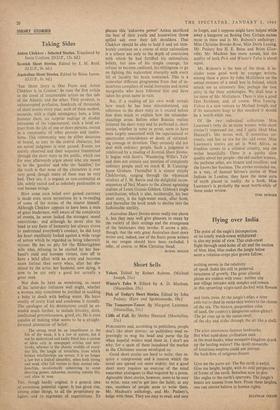Short Sells
Winter's Tales 9. Edited by A. D. Maclean. (Macmillan, 25s.) Pick of Today's Short Stories. Edited by John Pudney. (Eyre and Spottiswoode, 18s.) The Tomorrow-Tamer. By Margaret Laurence. (Macmillan, 21s.)
PUBLISFIERS and, according to publishers, people don't like short stories: so publishers tend re- provingly to wag the head and purse the lip when hopeful writers send them in. I don't see why; for a spate of them inundated the market as the Christmas season enveloped us.
Good short stories are hard to write; they re- quire a compression and 'a tension which the novel can spread out more widely; but a good short story requires an exercise of the mind somewhat analogous to that required by a poem. Agreeable short stories, however, seem to be easy to write, once you've got into the habit; at any rate, numbers of people seem to write them. Mr. Maclean's anthology, and Mr. Pudney's, bulge with them. They are easy to read, and easy
to forget, and I suppose might have helped while away a hangover on Boxing Day. Certain names recur in these and in Mr. Rubens's anthology: Miss Christine Brooke-Rose, Miss Doris Lessing. Mr. Pudney has H. E. Bates and Brian Glan- ville; Mr. Maclean has more names, but the quality of both Pick and Winter's Tales is about equal.
Mr. Rubens's is the best of the three. It in- cludes some good work by younger writers, among them a piece by John McGahern on the sexual tremors of a small boy in Ireland, which struck me as extremely fine, perhaps the best story in the three anthologies. We shall hear a lot more of Mr. McGahern. There is also a good Dan Jacobson, and, of course, Miss Lessing. Voices is a new venture by Michael Joseph, and if its successors keep to this standard it should be a worth-while one.
Of the two individual collections Miss Laurence's (why do so many women write short stories?) impressed me, and I quite liked Miss Hazzard's. She writes well, if sometimes un- evenly, and has an eye for the odd event. Miss Laurence's stories are set in West Africa, as freedom comes to a colonial country, and she writes beautifully. There is a quirky alive quality about her people—the old market woman, the perfume seller, are bizarre and excellent; and she knows her business. The stories reminded me, in a way, of Samuel Selvon's stories of West Indians in London; they have the same aura of myth placed in reality. As a book, Miss Laurence's is probably the most worth-while of those under review.
DOM MORAES






























 Previous page
Previous page